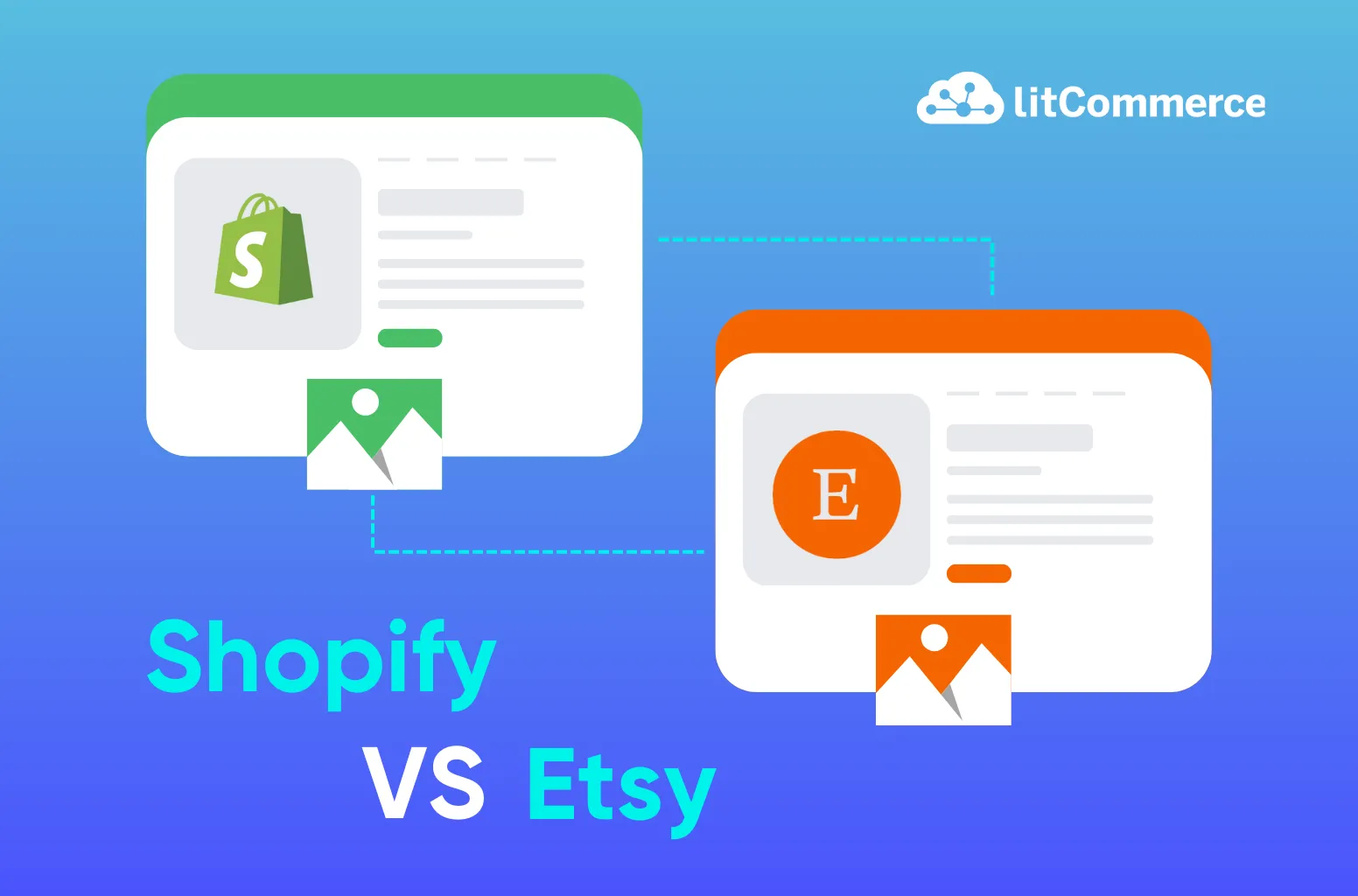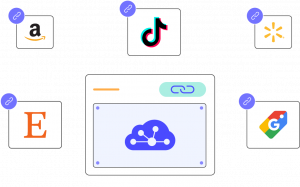Shopify vs Etsy – Which is better for your business?
First, let’s be clear about this: Shopify is an eCommerce platform, and Etsy is an online marketplace. From this very distinguished point and our experts’ perspectives, Shopify would win over Etsy if you are looking to build a functional online store and spread your brand awareness.
And those who just want to focus on the listing and earning part? Etsy would be the better choice. Evidently, Etsy has massive built-in traffic and huge credibility, as it is the world’s leading trading spot for creative and unique goods.
Wonder why we state these points? Keep reading and walk through our detailed Shopify Etsy comparison.
You may want to check out Etsy vs eBay comparison. Click here to read!
Shopify vs Etsy: The Overview
What is Shopify?
Shopify is a popular eCommerce platform that helps individuals and businesses create and run online stores easily with no technical skills. Launched in 2006, it offers everything you need to build a website, manage products, accept payments, and track sales across different channels like social media and physical stores.
With over 2.06 million merchants in 175+ countries, Shopify is known for being easy to use, highly scalable, and well-supported. It’s a great choice for both small businesses and large enterprises alike.
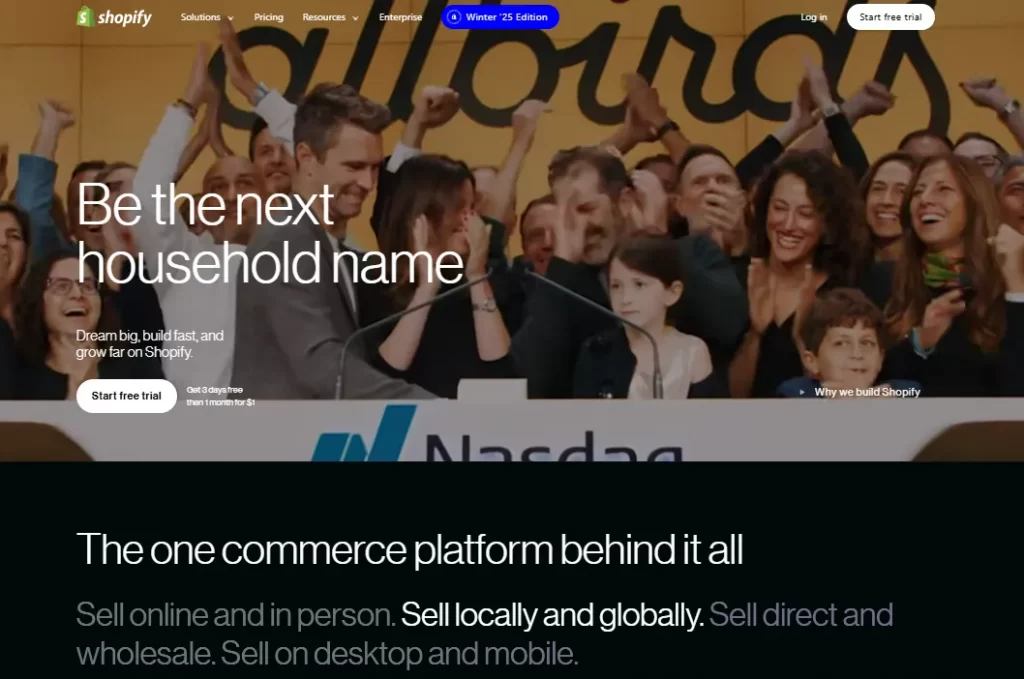
Pros:
- Powerful eCommerce tools: Shopify provides you with a complete set of powerful eCommerce tools covering any aspect of online business growth. Some of the essentials include a complete inventory management system, abandoned cart recovery, flexible payment options, and more.
- Great scalability: Shopify varies its plans for all types of business sizes, from small and medium to large. You can control how your brand grows, choose the upper grade for more features, and add apps.
- No restrictions on types and number of products: With Shopify, you can sell any type of product (physical goods, digital products, subscriptions, etc.) without the existence of quantity limits.
- Suitable pricing plans: For those who haven’t tried Shopify may assume Shopify is costly. However, Shopify pricing is completely reasonable once your business reaches potential growth.
Cons:
- Customer exposure: Selling with a standalone website, you will be the one who is totally in charge of SEO, ads, and email marketing so as to display your products to your customers as much as possible.
- Stacking up cost for Apps: For the need to grow your business, you might have to purchase lots of apps to add functionalities.
What is Etsy?
Etsy, on the other hand, is a global online marketplace founded in 2005, specializing in handmade, vintage, and unique items. It connects independent artists, crafters, and collectors with buyers seeking distinctive products that often carry a personal touch.
This platform allows sellers to create their own storefronts and list a wide variety of goods, such as jewelry, clothing, home decor, and craft supplies… Etsy operates on a peer-to-peer business model, fostering a community that values creativity and authenticity while offering low fees and various tools to help sellers succeed.
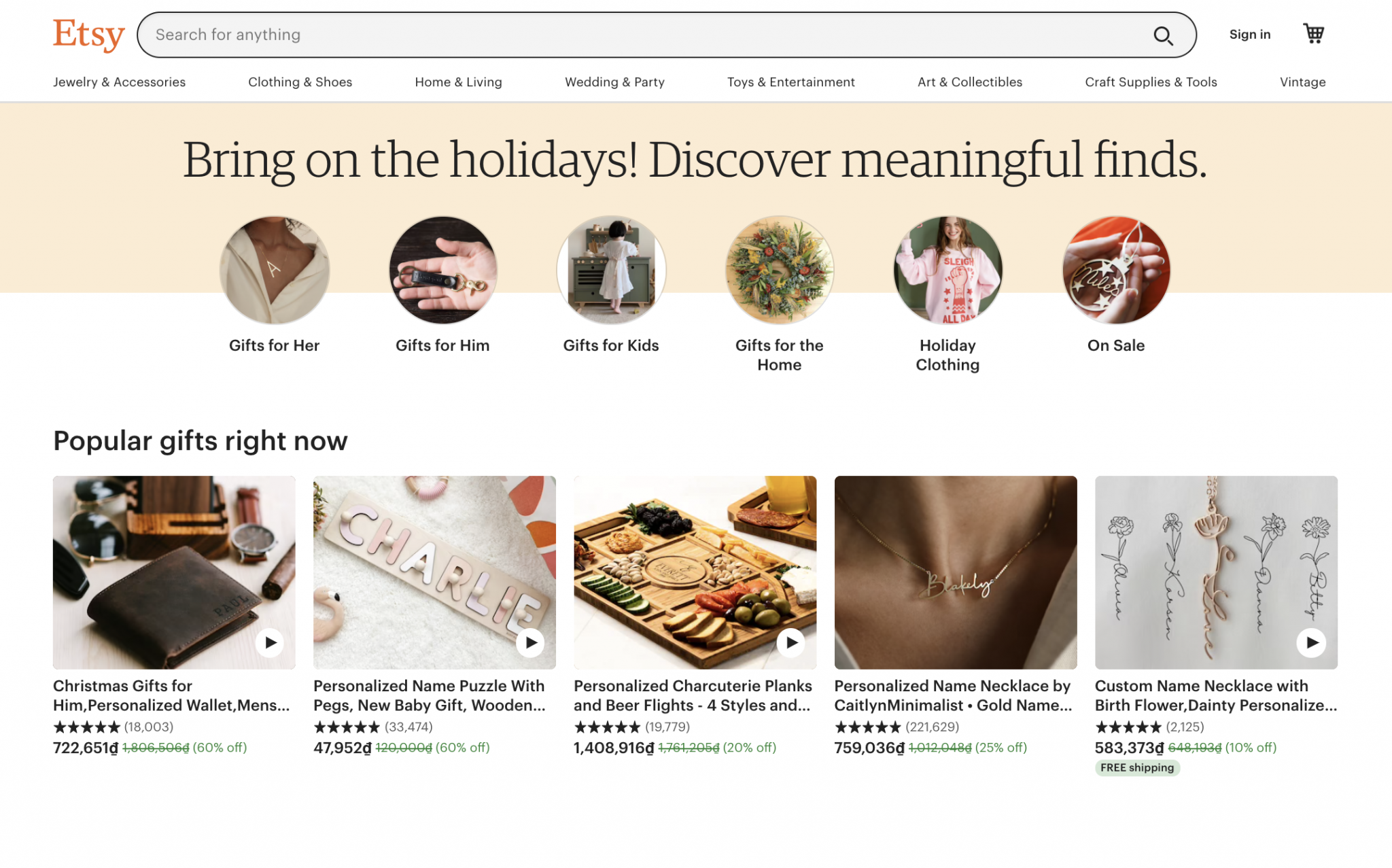
Pros:
- Customer exposure: As a marketplace possessing very high popularity, Etsy helps its merchants immediately approach a large number of customers
- Easy to use: You simply register for an account, upload government-issued photo ID, product images, set prices and promotions, then roll out!
- Low cost: With the Standard plan, you will pay for listing products and transaction fees. Aside from that, you don’t have to pay any extra monthly charges.
Cons:
- Product limit: There are regulations on what types of products you are allowed to sell on Etsy. This is mainly to guarantee that Etsy is a marketplace of distinctive, including handcrafted, vintage, and unique products.
- Lack of control: You will be sliding products along with other sellers in the same place and won’t be able to modify the look of your storefront. This makes it hard for you to approach customers via visual attraction, and you must rely mostly on ratings.
Shopify and Etsy? Why Not Both?
Have you considered integrating Shopify and Etsy to maximize your sales on both platforms?
Shopify vs Etsy: Quick Comparison
Now let’s break down some key differences between Shopify vs Etsy.
For a quick comparison, let’s look at our table below:
Shopify | Etsy | |
Selling fees | - Subscription fee starts at $19/month when paid yearly (can start for free and pay ONLY $1 for your first month) - No listing fees | - Standard: Free - Etsy plus: $10/month - Setup fee: $15-$29 (one-time payment) - $0.20 per listing (renewed every 4 months or when sold) |
Ease of use | Requires time to customize, but offers powerful tools for a branded store experience. | Simpler setup process. In 2025, the process of opening new Etsy store is more restricted by enhancing identity verification. |
Product types | No restrictions (e.g., physical, digital, subscriptions, etc.) | Restricted due to policy. |
eCommerce features | - A wide range of powerful eCommerce features. - Multichannel selling, abandoned cart recovery, and SSL certificates. | - Basic promotional tools - Sell on Etsy app for store management |
Customization and branding | Extensive customization with themes, custom domains, and checkout branding | Basic branding with limited shop customization; Etsy branding is prominent |
Traffic and marketing | Requires self-driven traffic and offers powerful marketing tools like SEO, email campaigns, and analytics | Built-in traffic; limited marketing options like Etsy Ads (onsite and offsite) |
Integrations and add-ons | Over 8,000 apps (e.g., LitCommerce, ShipBob, PageFly) | Limited integrations (e.g., Erank, ShipStation, Hootsuite) |
Help and support | 24/7 support via phone, chat, email, Help Center, and more | Help Center, email, and phone support; community forums available |
1. Shopify vs Etsy Fees
First, let’s examine Shopify’s selling fees.
Shopify has a primary cost: its subscription fee, a monthly charge for accessing the platform. For new users, Shopify offers a free trial or a $1/month plan for the first 3 months, making it easier to explore the platform before committing. After that, the pricing starts at $19 per month (when paid yearly) for the Basic plan and increases with higher-tier plans:
Starter | $5/month |
Basic | $25/month or $19/month if paid yearly For solo entrepreneurs |
Shopify | $65/month or $49/month if paid yearly For small teams |
Advanced | $399/month or $299/month if paid yearly For scaled businesses |
Plus | $2,300/month For more complex businesses |
If you use Shopify payments, Shopify’s built-in payment gateway, no transaction fees apply. However, using third-party payment gateways incurs transaction fees ranging from 0.5% to 2.0%, depending on your plan.
Also, other fees include:
- Payment processing fees: Charged for processing customer payments. For example, in the US, online payment fees are typically 2.9% + $0.30 per transaction, though this varies by country and currency.
- Shopify apps: If you rely heavily on Shopify’s app store, some Shopify apps may have high charges, which can add up to your overall fees.
So, what about Etsy selling fees?
Esty, in contrast to Shopify, primarily charges sellers for listing and transaction fees. There’s no mandatory subscription fee, but an optional Etsy plus plan is available for $10/month, providing features like customizable shop banners and marketing tools.
Have you ever heard of Etsy’s setup fees? If you’re starting a new Etsy shop in 2026, you may notice a one-time fee of between $15 and $29. Not everyone gets charged—it depends on your region and whether Etsy requires additional steps, such as verifying your information.
This fee helps cover the cost of setting up certain new shops. It usually appears during setup or shortly after and is listed on your monthly statement as “Setup Fee.” Just a friendly reminder: it’s non-refundable, even if you change your mind later.
Plus, Etsy charges $0.20 per product listing, which remains active for four months or until the product sells. If an item doesn’t sell within this period, you’ll need to renew the listing for another $0.20. Shopify, by comparison, does not charge for product listings.
About transaction fees, Etsy takes a 6.5% transaction fee on the total sale price, including shipping and gift-wrapping costs, significantly higher than Shopify’s transaction fees.
Other fees on Etsy:
- Payment processing fee: This fee depends on your location. For sellers in the U.S., it’s typically 3% + $0.25 per transaction.
- Currency conversion fee: If your shop currency differs from the currency of the customer’s payment, Etsy charges a 2.5% currency conversion fee.
- Etsy ads (optional): You can run ads to promote your products within Etsy’s marketplace. The cost is based on your set daily budget.
- Offsite ads fee: Etsy promotes your products on external platforms like Google or Facebook. If a sale is made through these ads:
- You’ll pay a 15% fee if your annual sales are below $10,000.
- This fee drops to 12% if your annual sales exceed $10,000.
Verdict: Shopify vs Etsy, each platform has its unique advantages, so consider what aligns best with your business model:
- Shopify: Offers scalable plans with feature-rich tools.
- Etsy: Keeps it simple with minimal listing fees.
The Perfect Match – Shopify and Etsy
Expand your market presence, increase brand visibility, and turn potential customers into loyal fans with LitCommerce Shopify Etsy integration.
2. Shopify vs Etsy: Ease of Use
You should know that Shopify is known for being one of the most user-friendly hosted eCommerce platforms.
While it’s not the easiest platform on the block, it makes setting up an online store a breeze. You won’t get a site live in 5 minutes, of course! But Shopify manages to combine powerful eCommerce features with an easy-to-use editor, even for total beginners.
After registering for an account on Shopify, you can follow its Shopify tutorial to set up your store. Basically, there are 3 primary steps you will have to go through, including adding products, designing your store, and configuring settings.
Although learning Shopify’s tools and settings takes some time, you can customize your store with themes, apps, and integrations to create a unique, branded experience.
On the other hand, on Etsy, things are even a lot easier.
You only need to create an account, add product listings, and start selling within minutes. The marketplace setup minimizes technical requirements, as Etsy handles the storefront design, hosting, and built-in audience outreach.
Verdict: Shopify has strong eCommerce tools and an easy editor for beginners, but setting it up takes more time. Etsy is simpler and faster, great for quick selling.
3. Shopify vs Etsy: Product Types
One of the biggest differences between Shopify vs Etsy is product types.
About Shopify, it has no product restrictions. This means you can sell anything once you’ve built a store. From consumption goods to furniture, feel free to list anything on Shopify.
More about Shopify products, this eCommerce platform would be a wonderful place to start a brand and spread your brand awareness. And if you are wondering what you should sell at your Shopify store? Here are some recommendations from Shopify itself for 2026:
- Vitamin and health supplements
- Perfume and cologne
- Skincare and makeup products
- Coats and jackets
- Bedding items (sheets and blankets)
- Drinkware
- Bath and body care products
- Candles
- Underwear
- Wine
As a niche online marketplace, Etsy products are more specific than those of Shopify. This marketplace is renowned for being the premier shopping destination for artisans, sculptures, wall art, posters, and more. Products listed on Etsy must always align with the house’s spirit, which refers to creativity and uniqueness.
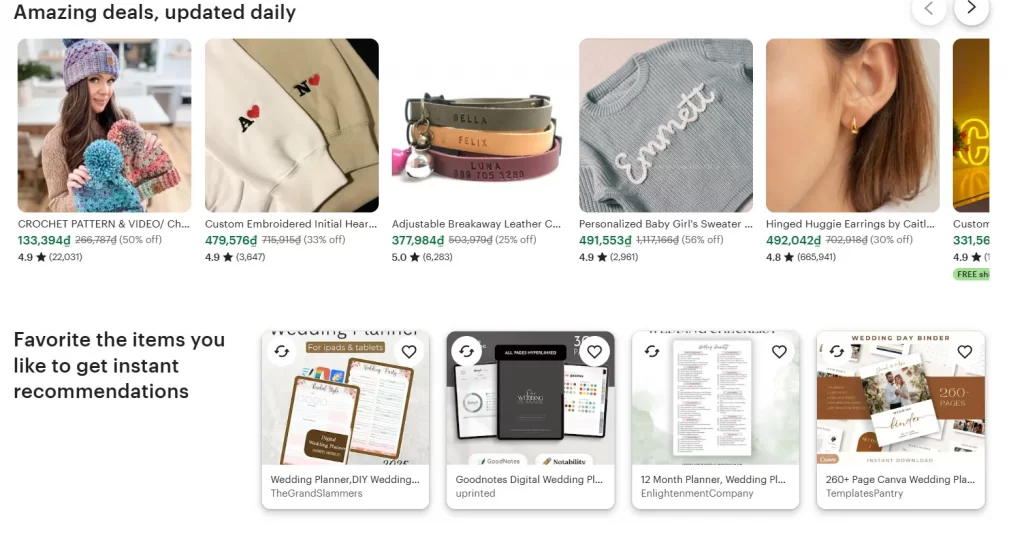
So, given the circumstances, what should you sell on Etsy in 2026? Here are some suggestions:
- Children’s and baby clothes
- Accessories
- Pet supplies
- Wallart
- Personalized gifts
- Drinkware
- Office supplies
- Craft supplies
Verdict: Shopify is great if you want to sell a wide range of products without restrictions, making it ideal for general or branded items. Etsy, however, is perfect for artisans, vintage items, or craft supplies, making it a top choice for handmade and creative goods.
4. Etsy vs Shopify: eCommerce Features
When selling on Etsy vs Shopify, the availability of eCommerce features is a must. It decides whether or not you will get covered with the ability to manage your business and get more Etsy sales.
With Shopify, this all-in-one platform provides sellers with a variety of features, even in its basic plan. Here’s a list of key features included in every Shopify plan:
- Gift cards
- Discount codes
- Shopify point of sale
- Multichannel selling
- Abandoned cart recovery
- SSL certificate
- Dropshipping
- Overview dashboard
- Finance report
- Fraud analysis
- Blogging
- Inventory and order management
- Unlimited bandwidth and online storage
Among these above features, multichannel selling is pretty important to help you expand exposure to potential customers.
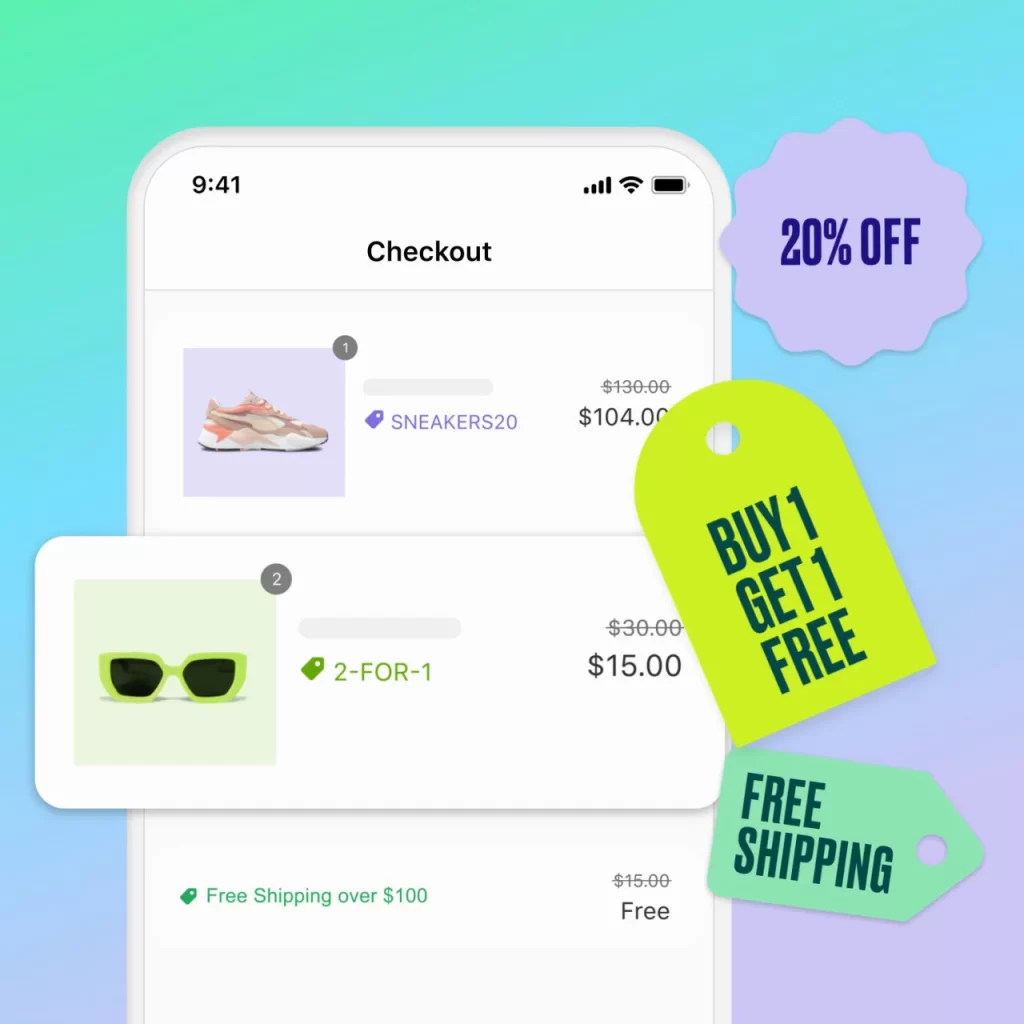
At this point, Etsy does it well by gearing you up with toolkits to help you manage your store with ease.
You can use the “Sell on Etsy app” to manage orders, update items, and respond to your customers on the go. Etsy also provides promotional tools that drive traffic, enlarge the customer base, or draw more followers for brand building.
Analyzing performance is crucial for any business and Etsy knows that at its best. In fact, Etsy provides you with the analytics report feature by default on every plan, showing detailed statistics on performance trends and traffic sources.
By upgrading to Etsy Plus, you will get access to more features:
- Create your own domain
- Advanced shop customization, such as multiple banners and layout options
- Access to discounts and perks
- Item availability email alert to customers
Verdict:. Looking at eCommerce features alone between Shopify vs Etsy, Shopify certainly wins over Etsy. The greater availability of features in Shopify may come along with higher fees compared to Etsy. If you want to keep it simple and small then Etsy’s basic features are good enough.
5. Shopify or Etsy? Customization and Branding
Let’s dive into Shopify first.
Shopify provides extensive options for customization and branding, allowing you to create a unique online presence that reflects your business identity.
- Themes: Shopify offers over 200 customizable themes, enabling users to select a design that aligns with their brand. You can modify layout, colors, and typography to match your aesthetic preferences.
- Custom product options: Shopify allows you to create customizable products by adding options like size, color, and material. This can be done directly in the product settings or by using apps that enhance product customization capabilities.
- Personalization features: You can integrate features such as text fields, checkboxes, or image uploads to enable customers to personalize products directly on the product page.
- Custom checkout experience: Shopify lets you add branding elements such as logos and background images to the checkout process. Hence, the entire purchasing experience is aligned with the brand’s identity, enhancing customer trust.
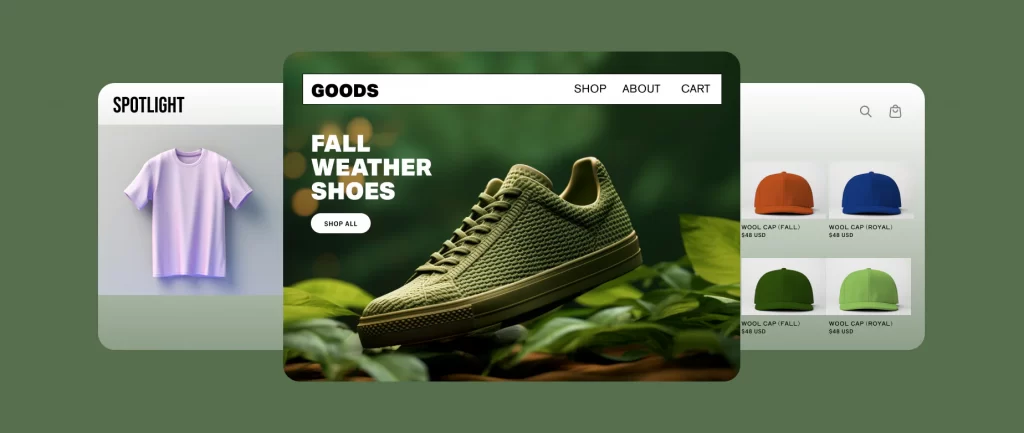
Etsy, on the other hand, provides a standardized storefront within its marketplace, which limits your ability to establish a unique brand:
- Customization options: Basic, with predefined shop layouts and limited design control.
- Etsy branding: Your shop is hosted on Etsy’s platform, so the Etsy brand is prominent in URLs and overall design.
- Audience focus: Etsy’s built-in audience helps drive traffic but may overshadow individual branding efforts.
Verdict: If you prioritize building a unique brand with full control over design and customer experience, Shopify is the clear winner. Etsy, on the other hand, is better suited for sellers looking for simplicity and exposure within a pre-established marketplace, though branding opportunities are limited.
Integrate Shopify with Etsy using LitCommerce
Integrate Shopify with Etsy using LitCommerce and join thousands of successful sellers. Take your leap today and kick off the multichannel journey!
6. Etsy or Shopify? Traffic and Marketing
When comparing Shopify vs Etsy, it’s essential to note that traffic on Shopify largely depends on your strategies and practices, as you will be driving traffic to your website independently.
Shopify also features a powerful app store with a wide range of apps and integrations to help you enhance your SEO efforts, drive traffic, and convert visitors into shoppers.
One more thing to consider about traffic and SEO on Shopify is that it’s more about your overall online presence, as your store will appear across multiple search engines. Keep that in mind.
Additionally, Shopify offers sellers like you a broader range of marketing tools. You can create a custom domain name and brand identity, run email marketing campaigns, integrate with social media platforms, and utilize various SEO strategies to improve your search ranking. Shopify also offers analytics to track your marketing performance and customer behavior.
Summing up, Shopify has quite great support to boost your marketing efforts, and with the right strategy, you’re going to score big. However, the workload is huge, and we think someone with higher expertise in marketing would be a match for selling on Shopify.
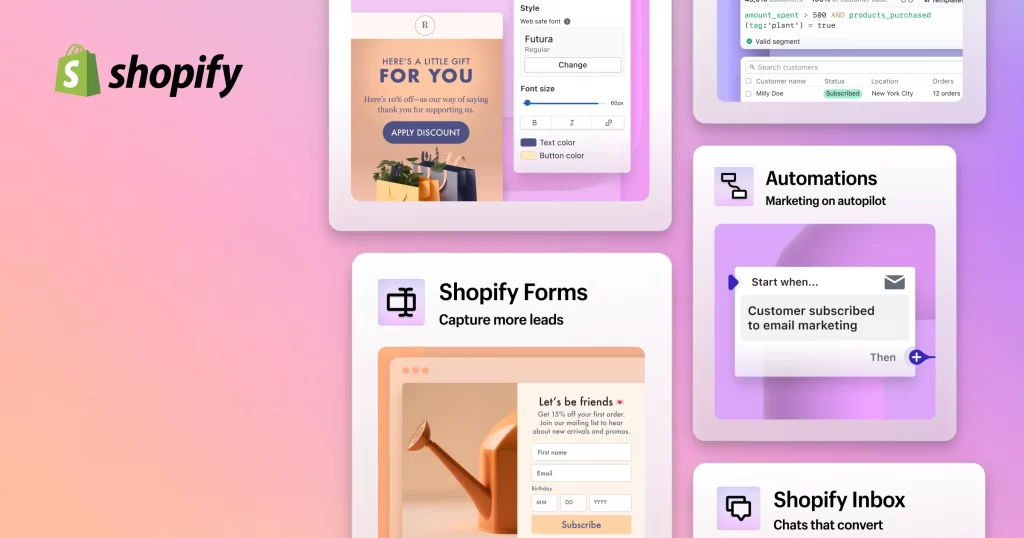
On Etsy, sellers don’t have to put so much effort into driving initial traffic, and they enjoy a massive built-in traffic source from Etsy. In fact, Etsy had up to 95.2 million active buyers in 2025 and is expected to increase this year, with over 400 million monthly visitors (reported by Yaguara).
Additionally, marketing efforts on Etsy are primarily focused on the marketplace. In other words, you will promote your listings within the marketplace. This is quite similar to eBay, Amazon, and many other marketplaces, as you will focus more on the selling aspect.
When choosing Etsy over Shopify, you will also have limited control over marketing. Yet, you can still leverage Etsy ads (onsite and offsite) to promote your products and make sales from them.
Verdict: Shopify would win if you are looking to build a strong brand with complete control over your marketing effort overall. However, you need a strong skillset and the right strategy to make it work. If you are just an individual seller who looks to earn a passive income online, Etsy is your ultimate choice.
7. Shopify vs Etsy: Integrations and Add-ons
Shopify offers a wide range of integrations and has the largest app store in the market, over 8000 apps. This means you can find almost anything you need to enhance your store.
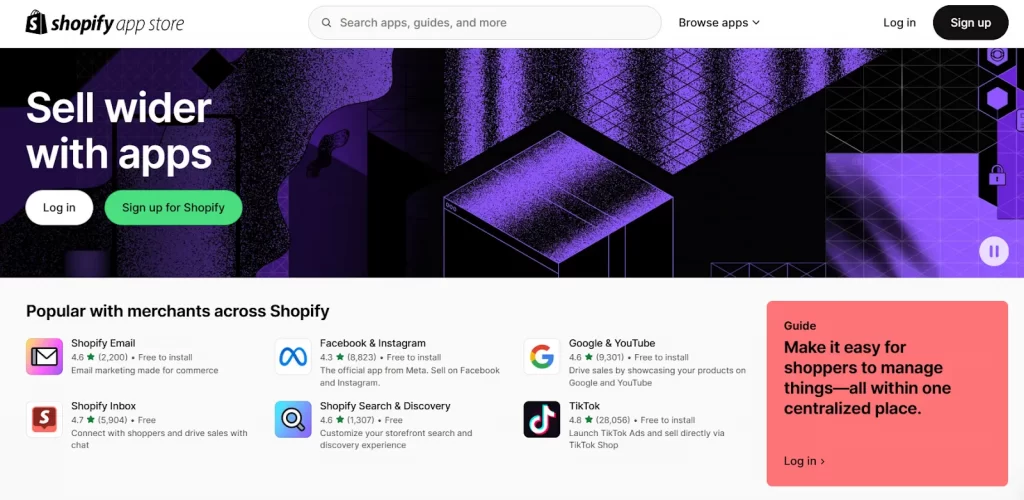
From inventory management to multichannel selling integrations, Shopify has it all. Speaking of which, you may have heard of some popular integrations and add-ons by Shopify:
- LitCommerce for multichannel selling
- ShipBob and ShipStation for fulfillment
- PageFly for page building
- Google Analytics and Shopify Analytics for analyzing and reporting
- Helpdesk for customer support
- BOGOS for promotions and a free gift with purchase.
And so many more!
In contrast, Etsy has quite limited integrations and add-ons compared to Shopify. Nonetheless, there are still some add-ons you can use for Etsy and boost your sales to their highest potential.
Some integrations and add-ons on Etsy are:
- EtsyHunt and Erank for Etsy SEO
- POD services
- ShipStation and ShipBob for fulfillment
- Hootsuite and Later for social media managing
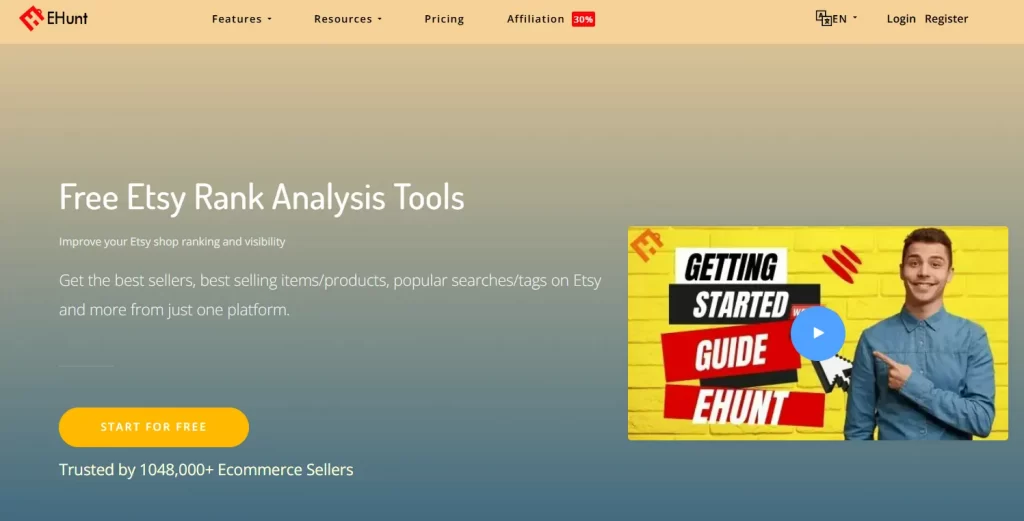
Verdict: Comparing Shopify vs Etsy, regarding integrations and add-ons, Shopify is much more of a powerhouse over Etsy, and there is no turning back on this
8. Shopify vs Etsy: Help and Support
Shopify is committed to helping sellers resolve their issues promptly. For upper plans, you can even access support from your own support team. Shopify offers help on various channels to assist you in selecting the best option for your needs. Specifically, it offers:
- 24/7 phone support
- Social media support
- 24/7 live chat support
- Community forum
- Email support
- Help Center
- Video tutorials
- Advanced specialist support
With Etsy, the options are less diverse. You can find answers to your problems in the Help Center, where information is displayed very cleanly and clearly. Etsy has an active forum where you can join discussions and receive great advice from other users. Email or direct phone contact is also on the list you can rely on for support.
Verdict: Shopify wins with more support channels and options.
Shopify vs Etsy: Final Comparison
Which is better: Shopify or Etsy? Have you decided where to kick off your business after our detailed comparison yet?
If you are still considering factors, we’ll let you take your time. Meanwhile, let us sum up the whole comparison for you right below:
- Shopify is great for business owners, especially if you have a strong skill set and perhaps a team to handle all the workload. Moreover, Shopify would be greater than Etsy if you are looking to gain more control and scale up your business. This eCommerce platform is going to provide you with everything necessary to enhance your online presence.
- Etsy is the better choice if you are an individual seller with artisans and creative products. You won’t have to worry about driving initial traffic, and you’ll be selling to the right audience who crave uniqueness. Just keep in mind that choosing Etsy over Shopify means you have less control, and you have to follow the marketplace’s rules strictly.
Shopify vs Etsy: FAQs
Using both Shopify vs Etsy for your business is literally the definition of synergy. This is super effective when you want to diversify your presence on the internet. Combining the use of Shopify vs Etsy helps you reach more audiences and make the most of the famous marketplace. By using the Etsy Marketplace Integration app, you can integrate the Etsy marketplace with your current Shopify store within 4 simple steps: Generally, publishing products on your Shopify store is done by manually importing products or using CSV files. However, this process might take time and cause unwanted errors especially when you sell on various marketplaces. As a result, LitCommerce app allows you to publish products from Etsy on your Shopify store within a few minutes and requires no technical skills. For detailed info, please follow our guidelines. Shopify wins if you want to build a functional store with strong brand recognition. It is also the case if you are going to sell products that are not really creative and unique goods. On the other hand, Etsy is a great choice if you just want to focus on the selling part, sell to its built-in vast audience, and earn from your artisans and handmade products. Many sellers looking to switch from Etsy to Shopify due to many reasons. Some want to scale their business up, others want to gain more control over their brand and marketing freedom. If you find yourself in similar situations, consider switching from Etsy to Shopify. If not, you can still leverage the power of the world-leading marketplace for creative and unique goods.
The Bottom Line: Did Shopify or Etsy Win?
Finally, we have delivered everything you need to know about Shopify vs Etsy. We bet that, by this point, you have realized that choosing a winner for Etsy or Shopify is not a fixed goal, given how they function. Shopify is a dedicated eCommerce platform that provides you with the ability to grow your business with your own brand. While Etsy allows you to keep it simple, selling online, focusing on the product’s distinctiveness.
If you’re interested in multichannel selling, check out LitCommerce to prepare for your first step! The tool enables you to import products from your eCommerce website, then list and sell them on the world’s largest online marketplaces, such as Amazon, Etsy, and eBay, making management work more efficiently and simply than ever before.
In case you need more info, please leave us a message. You can also visit the Retailer Blog for more helpful information. Happy selling!

